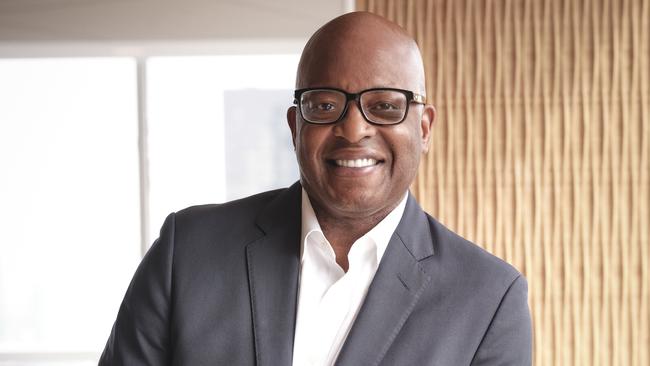Visa CMO talks ‘cracking the code’ to better marketing
Digital payments provider Visa’s chief marketing officer Frank Cooper III speaks exclusively to The Growth Agenda, as he explains why marketing must be both a horizontal and vertical practice within firms.

Digital payments provider Visa is moving ahead with rigour to tap the burgeoning creator economy for business growth, company chief marketing officer Frank Cooper III has said.
Speaking exclusively to The Growth Agenda during a visit to Sydney last week, the legendary marketer said it forms part of the company’s ambition to reach younger audiences as the business evolves with rapidly changing technological, market and societal shifts.
Marketing at Visa, a company with a market capitalisation in excess of $US500bn ($760bn), has long been considered a growth driver within the firm.
Visa’s big bet on the creator economy comes as younger millennials and Gen Z are increasingly listing being a creator or influencer as a top career aspiration.
Through Visa’s activities in the influencer arena, the company is currently supporting around 50 million artists, musicians, athletes and creators publishing content to turn their passions into full- or part-time sources of income.
The creator focus also underpins part of its partnership with the forthcoming Paris Olympics and Paralympics, which Visa has sponsored since 1986.
Through its Team Visa initiative, Visa is equipping athletes with the skills and knowledge to create content for their fan base and help advance their careers post-sport. In October last year, Visa held a “masterclass in creator storytelling” at the future site of the Paris Olympics with athletes such as American sprinter, Noah Lyles.

Mr Cooper has a professional reputation that precedes him. He is a versatile executive whose perspective on growth is clearly shaped by a breadth of creative and commercial experience.
Before joining Visa, he spent five years at investment multinational BlackRock as global chief marketing officer. He also worked as chief marketing and creative officer at Buzzfeed, and was at PepsiCo for 12 years as chief marketing officer of global consumer engagement. Mr Cooper is a Harvard Law School graduate – which he says shapes his thinking to this day – and also holds a bachelor of science degree in business administration from the University of California at Berkeley. Earlier in his career, he worked as an entertainment lawyer and served as a senior executive for music labels Motown and Def Jam.
There are clues in each of Mr Cooper’s career tentpoles that reveal his thinking; in his mind, marketing is both a vertical and horizontal business practice.
“Every experience that I’ve had, whether it was in law school, the entertainment business, technology, packaged goods – every single one I’ve taken away something that I’ve learned, and continued to apply as I go forward,” he said.
“But I don’t think about it as marketing. I think about it as business.”
Marketing is evolving, Mr Cooper explained, and, as an industry, has suffered from warped image perceptions of its own.
“The tragedy of marketing has been that there’s been a period of time where many people thought that marketing really was all about the sizzle. It was all about, ‘Do you have a massive commercial? Do you have a big stunt? Do you have this experiential event that you can launch, and then capture people’s attention and capture the imagination, win some awards, and you’re done?’,” he said.
“My view on it is that the only purpose of marketing really is to help the firm drive profitable growth. That’s what marketing should be doing. And the way in which we do it is by changing people’s perceptions and behaviours. That’s it.”
However, the marketing profession is up against some persistent headwinds. Mr Cooper said the biggest challenge marketing faces is “figuring out how to blend art and science”. He referred to the era of “performance”-led marketing, which saw a wave of companies jump to prioritise generating quick sales at the expense of long-term brand building.
Speaking of performance marketing, he said: “It seemed like the most profound thing we could do for our CFO, because it seemed to be a direct correlation between a marketing activity and a financial outcome. And they loved it.”
However, research has also revealed an over-reliance on the one type of marketing was hurting businesses in the long run.
“The problem is that you left all of the meaning and the depth of connection that people want from brands on the table. Those who actually went down the performance marketing route, many of them started to see that the competition started to outpace them, and started building greater loyalty with other people,” he said.
Many companies are now in the throes of blending both types of marketing, Mr Cooper added.
“In my view, it’s both the art and science right now. We’re in the period now where you can actually use the data and the analytics to get much more intelligent about how you connect to people.
“But there’s still a little bit of art to it, in the sense that you have to tell a story that’s meaningful.
“You have to understand what motivates people. You have to understand that relevance is not just about the category, it’s about culture.
“So if you can get category and cultural relevance, if you can get data and data science and art, and storytelling, all in one place, then you crack the code.”
That, however, requires a different type of marketer, he said.
“That’s a hybrid marketer that’s seen both sides of it. And that experiences both sides, that feels comfortable with data. And with storytelling.”
Throughout Mr Cooper’s career, he has noticed marketing is often siloed from other departments represented in the C-suite. He said part of the problem is one of translation. “It’s difficult, in part because (as) marketers, we do it to ourselves. We have our own language, we have our own way of thinking about what growth looks like. We’ll put together a measurement framework that only we really fully understand,” he said.
“The key to all of it, I think, in order to make a deeper connection across the C-suite in any firm, is really to translate that marketing jargon into language that everyone agrees that if you actually do this one thing, or two things, or three things or five things, they believe that it will advance the business.
“We could talk about ‘brand affinity’, we could talk about ‘purchase intent’, we can talk about all these things. They’re all true, by the way. But if you’re a non-marketer, the depth of meaning for these terms is about a half inch deep.”
Mr Cooper explained that marketing teams could benefit from outward-thinking.
“The brands and marketing departments that I’ve seen that are successful, they’ve created that translation layer that allows marketing jargon to be democratised throughout the firm.”







